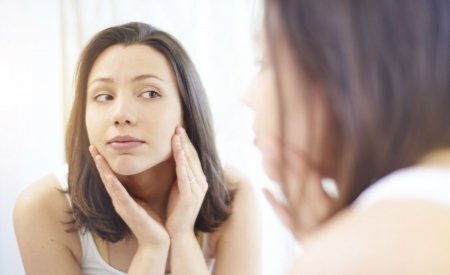Solutions & treatments
Acne and isotretinoin: a miracle solution?
Oral isotretinoin has a bad reputation due to its multiple side effects, which you might have heard about a few years ago.

Solutions & treatments
Oral isotretinoin has a bad reputation due to its multiple side effects, which you might have heard about a few years ago.
And yet it is highly effective and generally puts a permanent end to stubborn acne. Initially reserved for severe acne, it is tending to be prescribed more broadly and more quickly to prevent blemishes from setting in, especially in inflammatory acne.
This molecule is also available in cream and gel form for topical application. Oral route, topical route, restrictions concerning oral use, side effects and results: here we consider the ins and outs of isotretinoin.
Available by prescription only in both cases, isotretinoin treatment is subject to the opinion of a dermatologist. Topical isotretinoin is used for all types of acne, including very mild cases, alone or in combination with other active ingredients.
Oral isotretinoin is reserved, in principle, for moderate to severe acne with a high risk of scarring. Isotretinoin works by reducing the size of the sebaceous glands, thus limiting sebum production.
Its activity is supplemented by antibacterial and anti-inflammatory effects. The dose is adjusted according to the patient’s body weight and the severity of the lesions. No other oral or topical acne medications should be taken in parallel.
Only dermatologists can prescribe oral isotretinoin for patients starting treatment, although general practitioners can write repeat prescriptions. The use of this molecule is completely contraindicated in pregnant women, since isotretinoin is teratogenic for the foetus: this means it poses a very high risk of malformations.
It is therefore an aggressive and demanding treatment option.
It is a prescription-only medication that requires effective contraception, and a pregnancy test is required every month before any prescription can be refilled.
By significantly reducing sebum production, this molecule has severe drying effects on the entire body, including the skin, mucous membranes (lips) and eyes, with ocular dryness that is particularly difficult for contact lens wearers. This drying treatment weakens the skin, with several consequences: sun exposure should be avoided, while exfoliation and hair removal can be painful.
It can also have effects on the liver, and liver function tests are required periodically all throughout treatment.
It is common for spots and blemishes to get worse after starting treatment.
Several cases of depression and mental disorders were linked to oral isotretinoin at one point in time, but the connection was not clearly established. It is important to remember that acne itself promotes depression, especially in adolescents. Doctors should be vigilant in this regard throughout the duration and after the stoppage of treatment.
In most cases, treatment is highly effective within two to three months. However, there is a risk of recurrence after stopping isotretinoin, and a second course of treatment is sometimes necessary.
Isotretinoin should be taken with food, since fat boosts its efficacy. A study showed that absorption of the molecule by the digestive system was reduced by 40% when it was taken by itself without food.